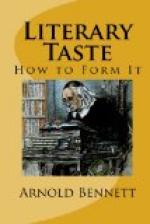CHAPTER XI
AN ENGLISH LIBRARY: PERIOD I
[For much counsel and correction in the matter of editions and prices I am indebted to my old and valued friend, Charles Young, head of the firm of Lamley & Co., booksellers, South Kensington.]
For the purposes of book-buying, I divide English literature, not strictly into historical epochs, but into three periods which, while scarcely arbitrary from the historical point of view, have nevertheless been calculated according to the space which they will occupy on the shelves and to the demands which they will make on the purse:
I. From the beginning to John Dryden, or roughly, to the end of the seventeenth century.
II. From William Congreve to Jane Austen, or roughly, the eighteenth century.
III. From Sir Walter Scott to the last deceased author who is recognised as a classic, or roughly, the nineteenth century.
Period III. will bulk the largest and cost the most; not necessarily because it contains more absolutely great books than the other periods (though in my opinion it does), but because it is nearest to us, and therefore fullest of interest for us.
I have not confined my choice to books of purely literary interest—that is to say, to works which are primarily works of literary art. Literature is the vehicle of philosophy, science, morals, religion, and history; and a library which aspires to be complete must comprise, in addition to imaginative works, all these branches of intellectual activity. Comprising all these branches, it cannot avoid comprising works of which the purely literary interest is almost nil.
On the other hand, I have excluded from consideration:—
i. Works whose sole importance is that they form a link in the chain of development. For example, nearly all the productions of authors between Chaucer and the beginning of the Elizabethan period, such as Gower, Hoccleve, and Skelton, whose works, for sufficient reason, are read only by professors and students who mean to be professors.




